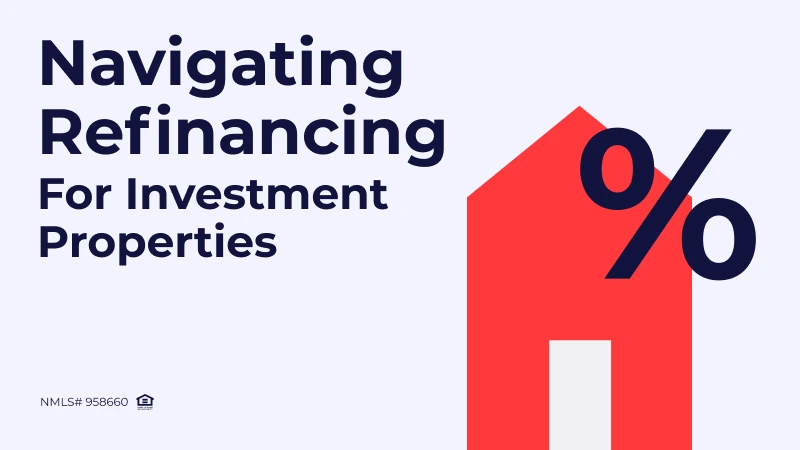
Mortgage brokers often work with a variety of clients, but those who hold investment properties present a unique set of challenges and opportunities. Refinancing these properties isn’t just about reducing interest rates or securing better terms, as it would be for a primary residence. Instead, it’s about maximizing the financial potential of the property, creating new investment opportunities, and improving overall cash flow. This guide will explore the strategies mortgage brokers can use to help their clients with refinancing investment properties, including specialized options like interest-only loans and using refinancing to expand property portfolios.
Why Refinance an Investment Property?
Refinancing an investment property can offer several advantages for property owners, depending on their goals. Some investors may seek to lower their interest rates and monthly payments, improving cash flow. Others may want to access the equity built up in their property to fund new investments or improvements. The motivations behind refinancing are key to determining the best strategy for the client.
Get the ADvantage
with our loyalty program
Earn and redeem points for valuable benefits for you and your clients
Unlock RewardsHere are some of the primary reasons investors refinance their properties.
- Lowering Interest Rates and Improving Cash Flow. Just as with a primary residence, investment property owners often refinance to take advantage of lower interest rates. A reduced rate can mean lower monthly payments, which boosts the property’s profitability.
- Converting ARMs to Fixed-Rate Mortgages. Adjustable-rate mortgages (ARMs) may start with lower rates, but over time, they can become unpredictable as rates adjust. Investors often refinance to lock in a stable, fixed rate, providing more financial certainty.
- Accessing Equity for New Investments. One of the most compelling reasons to refinance an investment property is to tap into the equity that has built up over time. This equity can be used for down payments on new properties or to improve existing ones, creating a path for portfolio growth.
- Restructuring Debt. Refinancing can also help investors consolidate higher-interest debts or rebalance their overall financial profile. This might involve combining multiple loans into a single, more manageable payment structure.
Key Considerations for Brokers When Refinancing Investment Properties
Refinancing an investment property is more complex than refinancing a primary residence. Lenders view investment properties as riskier due to the nature of rental income and the possibility that investors may not prioritize payments if they face financial challenges.
Here are the main factors mortgage brokers should consider when working with clients.
- Property Type Matters. Whether it’s a single-family home, a multi-family unit, or a commercial building, the property type significantly influences loan terms and the options available. Commercial properties, for example, may require more stringent underwriting and have higher interest rates.
- Borrower’s Financial Profile. Lenders will scrutinize the investor’s financial stability, including their credit score, existing debts, and the income generated from the investment property. Brokers should ensure their clients have robust financial documentation to improve approval chances.
- Loan-to-Value (LTV) Ratios. Investment properties often require lower LTV ratios compared to primary residences, meaning borrowers may need more equity in the property to refinance successfully. It’s common for lenders to require an LTV ratio of 70% or lower for investment properties.
- Cash Flow and Rental Income. Since the property is generating rental income, the cash flow it produces will be a key factor in securing refinancing. Lenders may require proof of rental income via tax returns or lease agreements, and they will often calculate the property’s Debt Service Coverage Ratio (DSCR) to assess its financial health.
- Potential Tax Implications. Refinancing an investment property can have tax implications, particularly when it comes to cash-out refinancing. Mortgage brokers should encourage their clients to consult with tax professionals to fully understand the impact.
Specialized Loan Options for Refinancing Investment Properties
Investment property owners often need more specialized refinancing options than traditional homeowners. These options can provide more flexibility and help investors achieve specific financial goals. Let’s look at some of the most common refinancing products for investment properties.
1. Interest-Only Loans
Interest-only loans allow borrowers to pay only the interest on the loan for a set period, typically between five and ten years. This means lower monthly payments during the interest-only period, which can help investors improve their cash flow and reinvest that money elsewhere. However, the downside is that after the interest-only period ends, payments increase significantly as the borrower begins paying both principal and interest.
Pros:
- Maximizes short-term cash flow.
- Allows investors to save or reinvest the money that would have gone toward principal payments.
Cons:
- Higher payments once the interest-only period ends.
- Risk of not building equity during the interest-only period.
Best Use Case
Investors looking to maximize their cash flow for a short period, such as those planning to sell the property before the interest-only period ends.
2. Cash-Out Refinancing
Cash-out refinancing allows property owners to tap into the equity they’ve built up in their investment property. By refinancing for more than they owe, they can receive the difference as cash. This cash can be used for renovations, property improvements, or as a down payment on a new property, enabling investors to expand their portfolios.
Example Scenario. A real estate investor who owns a multi-family rental property with significant equity might refinance to access cash for purchasing an additional property. This not only increases their property holdings but can also lead to greater rental income.
3. Portfolio Loans
Portfolio loans are ideal for investors who own multiple properties and want to refinance them together under a single loan. These loans are held by the mortgage lender rather than sold on the secondary market, which allows for more flexible underwriting criteria. Portfolio loans can also streamline debt management for property owners with multiple mortgages.
When to Consider. Investors with larger property portfolios who need a more flexible loan product, or who want to simplify loan management.
4. DSCR (Debt Service Coverage Ratio) Loans
DSCR loans focus on the income generated by the property rather than the borrower’s personal income. The DSCR measures the property’s cash flow relative to its debt obligations. A DSCR of 1.25 or higher is often required for refinancing. These loans are a good option for borrowers who may not have strong personal financials but have high-performing rental properties.

DSCR loans:
Grow your portfolio!
- DSCR as low as 0
- No income and no employment needed
- Fast turn times
Key Benefit. Allows investors to qualify based on the strength of the property’s income, not their own credit or personal income.
Strategies for Using Refinancing to Expand Property Portfolios
Refinancing can also be a key strategy for real estate investors looking to grow their portfolios. By accessing the equity in existing properties, investors can leverage that capital to acquire additional assets. Here’s how refinancing can help with portfolio expansion.
- Leverage Equity for New Acquisitions. Investors can use the equity built up in existing properties to finance new purchases, reducing the need for high down payments and keeping capital reserves intact.
- Refinancing Multi-Family Unit. Investors who own multi-family properties can refinance to improve cash flow, which can then be reinvested into other real estate opportunities.
- Case Study. An investor who owns a single rental property may choose to refinance and pull out $100,000 in equity. This cash can be used as a down payment on a second rental property, effectively doubling their investment portfolio with minimal out-of-pocket expenses.
Challenges Brokers May Face with Investment Property Refinancing
While refinancing investment properties can open doors to increased cash flow and portfolio growth, it also comes with its own set of challenges that brokers must be prepared to navigate. Here are some common hurdles that brokers and their clients may face.
1. Higher Interest Rates
Lenders typically view investment properties as riskier than primary residences, which means interest rates on refinancing loans for these properties tend to be higher. This can erode the potential savings that clients might expect from refinancing. Brokers must manage expectations and ensure that clients understand the cost-benefit analysis when refinancing an investment property.
Choose a top nationwide lender that cares about your growth!
Get Started2. Stricter Underwriting Standards
Because investment properties carry additional risks, lenders often have more stringent underwriting requirements. Borrowers may be required to provide more extensive documentation, including proof of rental income, property management experience, and a solid credit profile. It’s essential for brokers to guide their clients through gathering the necessary paperwork early in the process to avoid delays.
3. Managing Multiple Properties and Loans
For investors with larger portfolios, juggling multiple loans can become complicated. Refinancing one property while managing others can be a logistical and financial challenge. Portfolio loans, as mentioned earlier, can be a solution, but brokers should ensure that clients are fully aware of the financial commitments involved in consolidating multiple properties under one loan.
4. Appraisal Challenges
Appraising investment properties, especially multi-family units or mixed-use properties, can be more complex than appraising a primary residence. Factors such as market conditions, rental income, and property type all affect the valuation. If the appraisal comes in lower than expected, it can limit the amount of equity a borrower can access through refinancing. Brokers should prepare clients for potential appraisal challenges and suggest backup strategies in case of low valuations.
5. Credit Score Requirements
Lenders usually require higher credit scores for investment property refinancing compared to primary home refinancing. A borrower’s credit score directly impacts the terms of the loan, including the interest rate. Clients with credit issues may need to take time to improve their score before they can secure favorable refinancing terms. Brokers can add value by advising clients on how to improve their credit or by connecting them with credit counseling services.
6. Limited Lender Options
Not all lenders offer refinancing products for investment properties, which can limit choices for brokers and their clients. Specialized lenders, such as those offering non-QM (Non-Qualified Mortgage) products, may provide better options for refinancing these properties. Brokers should build relationships with lenders who have expertise in investment properties to ensure they can present a range of loan products to their clients.
Conclusion
Refinancing investment properties can be a highly effective strategy for property owners looking to optimize their financial returns, improve cash flow, or expand their portfolios. However, the process requires a more specialized approach compared to refinancing a primary residence. Mortgage brokers are crucial in guiding clients through the various loan products available. They help clients choose the best option based on their investment goals.
Enhanced Broker Portal
that makes your job easier
- All operations at your fingertips
- Easy-to-use intuitive interface
- Integrated AI technology
If you’re a mortgage broker looking to offer your clients specialized solutions for refinancing their investment properties, A&D Mortgage is here to help. With our industry-leading expertise in non-QM and investment property loans, we offer flexible, innovative loan products designed specifically for property investors.
Partner with us to provide your clients with the best refinancing options that meet their unique needs and goals. Contact A&D Mortgage today to learn more about how we can support your business and help your clients grow their property portfolios with confidence.


